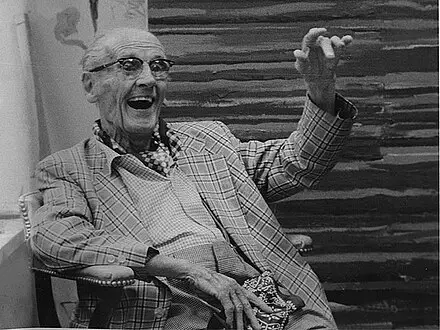
Marcel Moyse (1889 – 1984)
Marcel Moyse was a seminal French flutist and pedagogue, whose innovative techniques and expressive teaching significantly shaped modern flute playing worldwide.
Early Life and Formative Years
Marcel Moyse was born on May 17, 1889, in Saint-Amour, France. His early musical influence came from his family, particularly through an anecdote where he adopted his brother’s discarded tin whistle, which sparked his initial interest in wind instruments. The Moyse family’s relocation to Paris provided Marcel with exposure to the vibrant cultural and musical scene of the capital.
Education and Mentorship
Moyse’s formal musical education began with Adolphe Hennebains, who recognized his potential and nurtured his developing skills. This mentorship paved the way for his studies under Paul Taffanel at the Paris Conservatoire, where Moyse was profoundly influenced by Taffanel’s innovative approach to flute playing. This education culminated in Moyse winning the first prize at the Conservatoire at just seventeen years old, signaling his readiness for a professional career.
Professional Achievements and Contributions
Marcel Moyse’s professional career was marked by significant achievements, including principal flutist positions in prestigious Paris orchestras. His virtuosity and unique tonal quality, characterized by a clear, flexible, and penetrating sound controlled by a fast vibrato, became the defining elements of the ‘French style’ of flute playing. This style not only influenced his contemporaries but also set a modern standard for flutists globally.
Moyse also made notable recordings and appeared widely as a soloist, contributing to the flute repertoire and elevating the instrument’s status in classical music.
Pedagogical Impact
Moyse’s legacy is perhaps most enduring in the realm of music education. He taught at the Conservatoire de musique du Québec à Montréal and founded the Marlboro Music School and Festival in Vermont, influencing generations of flutists through his teaching philosophy. He emphasized musical expression over technical prowess, famously instructing his students “not how to play the flute, but to make music.”
His students, including James Galway, Paula Robison, Trevor Wye, and William Bennett, among others, have carried forward his teachings, impacting further generations.
Publications and Methodologies
Moyse authored several influential works on flute technique and musicality, including “De la Sonorité” and “Tone Development Through Interpretation.” These publications remain staples in flute pedagogy, used by students and professionals alike to refine their skills and deepen their musical expression.
Later Years and Legacy
Marcel Moyse continued to teach and perform well into his later years, remaining active in the musical community until his death on November 1, 1984, in Brattleboro, Vermont. His approach to flute playing and his pedagogical methods have left a lasting impact on the flute community, ensuring his place as one of the most influential flutists of the 20th century.
Moyse’s contributions to flute music and education have been recognized through numerous tributes and memorials, affirming his status as a pivotal figure in the development of modern flute playing. His philosophy and techniques continue to inspire and challenge flutists, securing his legacy in the world of classical music.
Publications by Marcel Moyse
- Études et exercices techniques (1921)
- Exercices journaliers (1922)
- 24 Études de virtuosité d’après Czerny (1927)
- Mécanisme-chromatisme pour flûte (1927); Éditions Alphonse Leduc
- École de l’articulation (1927); Éditions Alphonse Leduc
- 25 Études mélodiques (Var) (1928)
- 12 Études de grande virtuosité d’après Chopin (1928); Éditions Alphonse Leduc
- 20 Études d’après Kreutzer (1928)
- 100 Études faciles et progressives d’après Cramer (1928); 2 volumes
- 24 Petites études mélodiques (Var) (1928)
- 48 Études de virtuosité; 1er cahier (1933); Éditions Alphonse Leduc
- 48 Études de virtuosité; 2e cahier (1935); Éditions Alphonse Leduc
- De la Sonorité (1934)
- 25 Études journaliers (Op-53) Soussman
- Gammes et Arpèges (Scales and Arpeggios); Éditions Alphonse Leduc
- Le Débutant flûtiste (1935)
- 24 Caprices-études: Boehm Op. 26 (1938)
- Tone Development Through Interpretation
- 20 Exercices et études sur les Grandes Liaisons
Recordings by Marcel Moyse
Orchestral Suite No. 2, BWV 1067 performed with The Adolf Busch Chamber Players, featuring:
- Movements 4 (Bourrée I/II) and 5 (Polonaise) – Duration: 4:35
- Movements 6 (Minuet) and 7 (Badinerie) – Duration: 2:47
The Complete Works of the Great Flutist – A five-CD box set including restored and remastered recordings of Moyse’s performances.
Selected Works from the Recordings:
- Flute Fantastique
- Fantasie brillante for Flute and Piano on Bizet’s Carmen
- Carnival of the Animals: The Swan
- Mélodie for Flute and Piano
- Madrigal for Flute and Piano
- Souvenir de Gand
- Fantasie Mélancolique, Op. 1
- Suite for Orchestra No. 2 in B minor, BWV 1067: Polonaise and Badinerie
- Andante pastorale et Scherzettino
- Syrinx
- Fantasie pastorale hongroise for Flute and Piano, Op. 26
- L’arlésienne: Suite No. 1: 2nd movement, Menuet
- Variations de concert sur le Carnaval de Venise
- Orfeo ed Euridice: Les Champs-Elysées
- By the Brook
- Quartet for Strings No. 1 in D major, Op. 11: 2nd movement, Andante cantabile
- Fantaisie for Flute and Piano
- Marcel Plays Mozart – Featuring Flute and Harp Concerto, Concertos in D and G, and JS Bach’s Flute Piano and Violin Sonata
- Marcel Moyse and Marlboro Alumni – A rare CD where Moyse conducts Mozart’s Serenade No. 10 in B-flat (Grand Partita) for 13 winds.
This event has passed.
Birthday of Marcel Moyse

